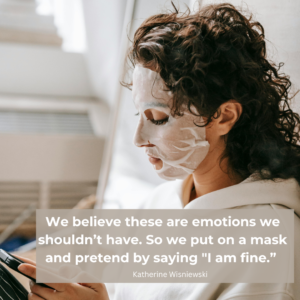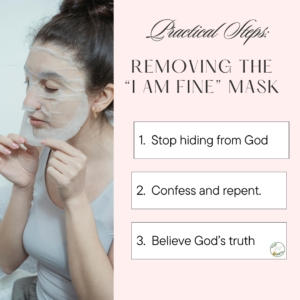I Am Fine
Do you ever say “I am fine” when you don’t really mean it? After all, everyone knows if a woman ends an argument with the word “FINE,” then the other person is in deep trouble. Because what she really means is: “I’m right. You’re wrong. And leave me alone!”
But we say “I am fine” when, in fact, we are anything but. After all, most people automatically respond to the greeting, “Hi, How are you?” with a quick, “I’m fine. How about you?” That’s because saying this is simply a habit and is considered proper etiquette.

Are You Really Fine, or Wearing a Mask?
As Christians, we are bombarded with messages about relying on God and having faith. So, when we are actually walking through a difficult season or struggling with powerful emotions of disappointment, discouragement, or depression, we may be afraid of admitting it. We believe these are emotions we shouldn’t have, so we put on a mask and pretend by saying, “I am fine.”
My Story
However, concealing how we really feel by wearing a mask can be dangerous. I know because I said, “I am fine”, but suffered in silence for years. And it nearly cost me everything. You see, my silence gave the enemy a foothold. He barraged me with guilt about my past and my identity. But the hardest part was knowing, as a Christian, I was supposed to be a new creation. I knew I should live in freedom from my past sins and bask in God’s unconditional love. However, because I didn’t feel any of these things, I thought something was wrong with me. Had I missed a step? Had I done something wrong? Perhaps I was just too damaged and unworthy of God’s love.
So I wore the “I am fine” mask and hid my true feelings. I didn’t want anyone to see my weaknesses. I was afraid. If people knew the truth, they wouldn’t like me. People might judge me or even reject me. But the truth was, I was living with lingering scars from childhood abuse and rejection. I was living in a family with active alcoholism. And I was dealing with the grief and loss of my son and stepfather. But instead of getting the help I needed, I buried it and pretended I was fine.
As time passed, I pushed everyone away: my friends, family, and even God. I suffered with my self-loathing thoughts, compounded by the enemy’s lies and condemnation, as my only company for years. I let the enemy beat me down with his lies until I began hating myself. Eventually, the shame was so unbearable I stopped wanting to live.

Shame
Shame starts as a lie we tell ourselves. We tell ourselves we aren’t worthy enough for forgiveness. But it becomes a heavy boulder we carry around, which can drive us into the ground. And I believe the enemy sits right on top of it, whispering lies in our ears. He lies about who we are, who we aren’t, what we’ve done, and what’s been done to us. These lies tell us no matter what we do, we will never be good enough. And over time, we not only believe these lies, but they lead to self hatred.
Thus, shame is a deep-seated condition of self-degradation in one’s soul. Shame stems from an inner belief that something is wrong with us, making us unworthy of love and acceptance. Thus, we believe we are less than who God says we are. This loss of self-worth creates despondency, destroying us from the inside out. In fact, the Hebrew word for shame is “bosh,” which means feeling utterly dejected. Shame creates fear. We fear we can never overcome our past. And the enemy fuels it by condemning us with broad lies, like: “You are stupid.” “You are a failure.” “You are worthless.”
But God will never condemn us with broad lies like this. Sometimes, He may convict us about a specific action or poor choice. He might say something like: “You lost your temper.” “You didn’t listen.” “You interrupted again. ” or “Those were not loving words.” But God convicts us so we can correct our behavior and become more like Jesus. God wants us to seek and receive His forgiveness, repent, and move forward.

Defeating the Shame
Admit you are not fine. Be willing to get help. Find a Christian counselor and do the work. If finances prevent this, find a mentor or someone you can trust and confide in.
Thankfully, I finally sought help from a Christian counselor. He helped me deal with my grief and shame by leading me to God’s Word. There, I found the true source of my identity and worth. And this became the only place I could find comfort and peace. God’s presence lifted me out of the soil of despair, and I began blooming in the strength of His love.
As part of my treatment, my counselor directed me to read both the Bible and Robert McGee’s The Search for Significance: Seeing Your True Worth Through God’s Eyes. This book contains a workbook portion to reflect on God’s truth. Although it is quite old, it is still in print. I highly recommend it as a great tool.

Time to Fight Back: Remove the “I Am Fine” Mask
Get mad! Fight back! The enemy makes you believe you’re unworthy of God’s love and acceptance. But, no one is worthy. Yet, God loves and forgives us anyway! Why? Because God is good!
“GOD is all mercy and grace— not quick to anger, is rich in love. GOD is good to one and all; everything he does is soaked through with grace” (Psalms 145:8-9 MSG) .
“for all have sinned and fall short of the glory of God, and all are justified freely by his grace through the redemption that came by Christ Jesus” (Romans 3:23-24).
“This is love: not that we loved God, but that he loved us and sent his Son as an atoning sacrifice for our sins” (1 John 4:10).

Practical Steps: How to Remove “I Am Fine” Mask:
- Stop hiding from God:
Pray. Tell God how you feel, He knows anyway. Give God your fears, and worries and exchange them for intimacy with Him.
“Draw near to God, and he will draw near to you” (James 4:8).
“Do not be anxious about anything, but in every situation, by prayer and petition, with thanksgiving, present your requests to God. And the peace of God, which transcends all understanding, will guard your hearts and your minds in Christ Jesus” (Philippians 4:6-7).
- Confess and repent:
Everyone has sinned. So seek forgiveness for anything the enemy might use against you. Then turn away from it. In return you will find forgiveness, peace and freedom.
Even if you feel shame because of something someone did to you, confess how it made you believe lies over God’s word. Then make a choice. Believe God’s truth.
“Whoever conceals his transgressions will not prosper, but he who confesses and forsakes them will obtain mercy” (Proverbs 28:13).
“Repent therefore, and turn back, that your sins may be blotted out” (Acts 3:19).
- Believe God’s truth:
The best way you can build your faith is by reading the bible. Knowing God’s truth helps you recognize the enemy’s lies, as well as the lies you’re telling yourself.
Replace the lies with God’s truth. You can recognize a lie by asking yourself, “Would God say this about me?” And if you aren’t sure, read your bible and find out.
Remember, speak God’s word aloud so both you and the enemy hear it.
“So then faith comes by hearing, and hearing by the word of God” (Romans 10:17).
“We demolish arguments and every pretension that sets itself up against the knowledge of God, and we take captive every thought to make it obedient to Christ” (2 Corinthians 10:5).

You Aren’t Alone
Friend, the enemy wants you to believe you are beyond help and all alone. But you aren’t. Even Jesus suffered. He understands how excruciatingly painful the human experience can be.
“He was despised and rejected by mankind, a man of suffering, and familiar with pain. Like one from whom people hide their faces he was despised, and we held him in low esteem.” (Isaiah 53:3, NIV)
Jesus understands, so don’t be afraid. Reach for Him. And I understand. I am not a professional, but I am here if you need a listening ear. Don’t let the enemy press you down any longer. If you know you really are not fine, then I implore you, seek help.
Resources:
The Search for Significance: Seeing Your True Worth Through God’s Eyes
Breaking The Chains Biblical Recovery Ministry







